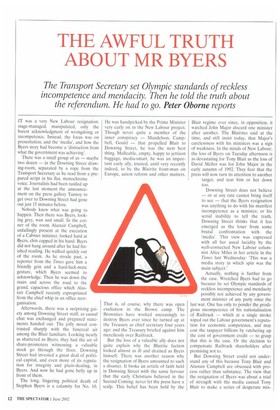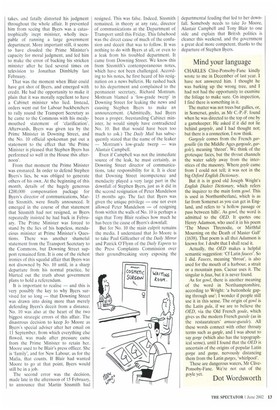THE AWFUL TRUTH ABOUT MR BYERS
The Transport Secretary set Olympic standards of reckless incompetence and mendacity. Then he told the truth about
the referendum. He had to go. Peter °borne reports
IT was a very New Labour resignation: stage-managed, manipulated, only the barest acknowledgment of wrongdoing or incompetence. Instead, the focus was on presentation, and the 'media', and how the Byers story had become a 'distraction from what the government was achieving'.
There was a small group of us — maybe two dozen — in the Downing Street drawing-room, separated by a rope from the Transport Secretary as he read from a prepared script in his flat, monochrome voice. Journalists had been rustled up at the last moment: the announcement on the press gallery Tannoy to get over to Downing Street had gone out just 15 minutes before.
Nobody knew what was going to happen. Then there was Byers, looking grey, wan and small. In the corner of the room Alastair Campbell, unfailingly present at the execution of a Cabinet minister, looked hard at Byers, chin cupped in his hand. Byers did not hang around after he had finished reading. He walked quickly out of the room. As he strode past, a reporter from the Times gave him a friendly grin and a hard-luck-mate gesture, which Byers seemed to acknowledge. Then he was down the stairs and across the road to the grand, capacious office which Alastair Campbell recently expropriated from the chief whip in an office reorganisation.
Afterwards, there was a surprising gaiety among Downing Street staff, as casual chat was exchanged and prepared statements handed out. The jolly mood contrasted sharply with the funereal air among the Blair familiars. Looking nearly as shattered as Byers, they had the air of share-promoters witnessing a valuable stock go through the floor. Downing Street had invested a great deal of political capital, and even more of its reputation for integrity and plain-dealing, in Byers. And now he had gone belly up in front of them.
The long, lingering political death of Stephen Byers is a calamity for No. 10. He was handpicked by the Prime Minister very early on in the New Labour project. Though never quite a member of the inner conspiracy — Mandelson, Campbell, Gould — that propelled Blair to Downing Street, he was the next best thing. Malleable, empty, happy to jettison baggage, media-smart, he was an important early ally, trusted, until very recently indeed, to be the Blairite front-man on Europe, union reform and other matters.
That is, of course, why there was open exultation in the Brown camp. The Brownites have worked unceasingly to destroy Byers ever since he turned up at the Treasury as chief secretary four years ago: and the Treasury briefed against him mercilessly over Railtrack.
But the loss of a valuable ally does not quite explain why the Blairite faction looked almost as ill and drained as Byers himself. There was another reason why the resignation of Byers amounted to such a disaster. It broke an article of faith held in Downing Street with the same fervour that the early Christians believed in the Second Coming: never let the press have a scalp. This belief has been held by the
Blair regime ever since, in opposition, it watched John Major discard one minister after another. The Blairites said at the time, and still insist today, that Major's carelessness with his ministers was a sign of weakness. In the minds of New Labour, the loss of Byers on Tuesday afternoon is as devastating for Tony Blair as the loss of David Mellor was for John Major in the early autumn of 1992. They fear that the press will now turn its attention to another target, and tear him or her down too.
Downing Street does not believe — or at any rate cannot bring itself to see — that the Byers resignation was anything to do with his manifest incompetence as a minister, or his serial inability to tell the truth. Downing Street thinks that it has emerged as the loser from some brutal confrontation with the 'media'. This view was expressed with all her usual lucidity by the well-connected New Labour columnist Alice Miles in her article in the Times last Wednesday: 'This was a media story in which spin was the main subject.'
Actually, nothing is further from the case. Wretched Byers had to go because he set Olympic standards of reckless incompetence and mendacity possibly not achieved by any government minister of any party since the last war. One has only to ponder the prodigious incompetence of his nationalisation of Railtrack — which at a single stroke wiped out the Labour government's reputation for economic competence, and may cost the taxpayer billions by ratcheting up the cost of government credit — to grasp that this is the case. Or the decision to compensate Railtrack shareholders after promising not to.
But Downing Street could not understand any of this because Tony Blair and Alastair Campbell are obsessed with process rather than substance. The view that the resignation of Byers was about a trial of strength with the media caused Tony Blair to make a series of desperate mis takes, and fatally distorted his judgment throughout the whole affair. It prevented him from seeing that Byers was a catastrophically inept minister, wholly incapable of running a large government department. More important still, it seems to have clouded the Prime Minister's capacity for moral judgment, and led him to make the error of backing his stricken minister after he lied several times on television to Jonathan Dimbleby last February.
That was the moment when Blair could have got shot of Byers, and emerged with credit. He had the opportunity to make it plain that it was morally repellent to have a Cabinet minister who lied. Instead, orders went out for Labour backbenchers to rally round the Transport Secretary as he came to the Commons with his mealymouthed statement of 'clarification'. Afterwards, Byers was given tea by the Prime Minister in Downing Street, and the No. 10 official spokesman put out a statement to the effect that 'the Prime Minister is pleased that Stephen Byers has performed so well in the House this afternoon'.
From that moment the Prime Minister was ensnared. In order to defend Stephen Byers's lies, he was obliged to generate others of his own. At the beginning of this month, details of the hugely generous £200,000 compensation package for Byers's director of communications, Martin Sixsmith, were finally announced. It emerged in the course of that statement that Sixsmith had not resigned, as Byers repeatedly insisted he had back in February. The Prime Minister was forced to stand by the lies of his hopeless, mendacious minister at Prime Minister's Questions. There was another shameful statement from the Transport Secretary to the Commons, but Downing Street support remained firm. It is one of the richest ironies of this squalid affair that Byers was not disowned by No. 10 until, in a sharp departure from his normal practice, he blurted out the truth about government plans to hold a referendum.
It is important to realise — and this is very possibly the key to why Byers survived for so long — that Downing Street was drawn into doing more than merely defending Byers's deceit from a distance. No. 10 was also at the heart of the two biggest strategic errors of this affair. The disastrous decision to keep Jo Moore as Byers's special adviser after her email on 11 September, from which everything else flowed, was made after pressure came from the Prime Minister to retain her. Moore used to be Blair's press officer. She is 'family', and for New Labour, as for the Mafia, that counts. If Blair had wanted Moore to go at that point, Byers would still be in a job.
The second error was the decision, made late in the afternoon of 15 February, to announce that Martin Sixsmith had
resigned. This was false. Indeed. Sixsmith remained, in theory at any rate, director of communications at the Department of Transport until this Friday. This falsehood was the direct cause of much of the confusion and deceit that was to follow. It was nothing to do with Byers at all, or even to a leak from his troubled department. It came from Downing Street. We know this from Sixsmith's contemporaneous notes, which have not been challenged. According to his notes, he first heard of his resignation on a news bulletin. He rushed back to his department and complained to the permanent secretary, Richard Mottram. Mottram blamed a `low-grade twerp' in Downing Street for leaking the news and causing Stephen Byers to make an announcement. (Admittedly, had Byers been a proper, freestanding Cabinet minister, he would simply have contradicted No. 10. But that would have been too much to ask.) The Daily Mail has subsequently stated that the name of the leaker
Mottram's low-grade twerp — was Alastair Campbell.
Even if Campbell was not the immediate source of the leak, he must certainly. as Downing Street director of communications, take responsibility for it. It is clear that Downing Street incompetence and mendacity played a very large part in the downfall of Stephen Byers, just as it did in the second resignation of Peter Mandeison 15 months ago. The fact that Byers was given the unique privilege — one not even allowed Peter Mandelson — of resigning from within the walls of No. 10 is perhaps a sign that Tony Blair realises how much he has been the cause of Byers's downfall.
But for No. 10 the main culprit remains the media. I understand that Jo Moore is to take Paul Gilfeather of the Daily Mirror and Patrick O'Flynn of the Daily Express to the Press Complaints Commission over their groundbreaking story exposing the
departmental feuding that led to her downfall. Somebody needs to take Jo Moore, Alastair Campbell and Tony Blair to one side and explain that British politics is cleaner this weekend, and the government a great deal more competent, thanks to the departure of Stephen Byers.







































































 Previous page
Previous page